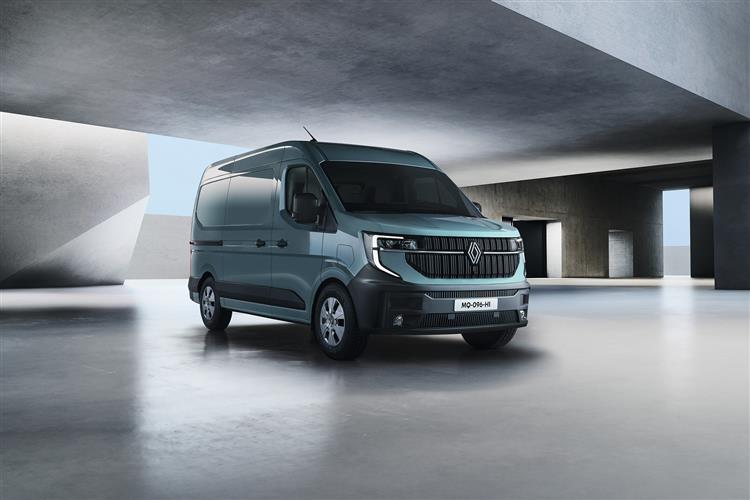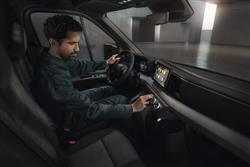MASTER CLASS? (some text hidden) --NONE--
By Jonathan Crouch
The fourth generation version of Renault's big Master van is a big step forward, thinks Jonathan Crouch
Ten Second Reviewword count: 49
The Renault Master has been redesigned for a new era, this large LCV now smarter, more efficient and more car-like. There are three different powertrain formats, including a much improved full-EV version. And all of them are as practical with this MK4 design as the Master has always been.
Backgroundword count: 162
Here's a very different kind of Renault Master. This, Renault's large LCV model line, has been around since 1980, with over 3 million examples sold in 50 countries over three generations, all of them built in Batilly, near Metz in Eastern France. This fourth generation version though, is arguably the most significant yet, described by its maker as 'the next generation multi-energy aero van'. That's a reference to the way this sleeker big LCV's new platform can accommodate three power sources - diesel, electric and hydrogen. Whatever your choice of variant, Renault claims it will be able to go further, carry more and cost less. Well, cost less to run anyway. All the engineering, as before, is shared with the Nissan Interstar (though this time round, not with the Vauxhall Movano). And brings Renault much closer to the new standards being set in this class by latest versions of the Mercedes Sprinter and the 2-tonne Ford Transit. Let's take a closer look.
Engines and Tech Specword count: 284
This MK4 Master's 'Multi-Energy' platform has been engineered for three completely different kinds of drivetrain. One of these - a hydrogen engine and fuel cell set-up - is for the future. For now is the previous model's usual diesel Blue dCi unit, available with 130 or 150hp, the latter with an auto transmission option. At the top of the range is an auto-only Blue dCI 170 variant. The alternative is a much improved E-Tech electric powertrain with a much bigger 87kWh battery that provides for a vastly improved range figure of up to 285 miles. The EV variant has much improved pulling power too, thanks to a new 140hp motor delivering 300Nm of torque. Renault's also worked hard on a novel new power-assisted dynamic braking control system that keeps braking effectiveness and pedal feel the same, regardless of how much weight the van is carrying. It also triggers the automatic emergency braking system sooner (response time has been halved) and enhances regeneration, extending the range of the electric versions. And, as you'd expect from an all-new design, the portfolio of camera and radar driver assistance and safety features has been widened. There are now 20 available systems to maximise safety for people in and around the vehicle. It's active safety features include its lateral stability, automatic emergency braking and trailer stability assist systems. It also comes with Intelligent Speed Assist to help the driver stay within the speed limit. The shorter wheelbase and redesigned front axle provide for extra manoeuvrability, including a 1.5-metre-shorter turning diameter. Customers can choose an L3 version for the city driving (L2 is the base vehicle, L3 is available with front wheel and rear-wheel drive and L4 has rear-wheel drive).
To see the full road test text contact us on 0330 0020 227
Pictures (high res disabled)

.jpg)
|
.jpg)
|
.jpg)
| |||
.jpg)
|
.jpg)
|

|
Statistics (subset of data only)
Min |
Max |
|
Price: |
£40,200.00 (At 22 Nov 2024) |
£51,255.00 (At 22 Nov 2024) |
CO2 (g/km): |
200 (Blue dCi 130 est) |
|
Electric WLTP-Rated Driving Range (miles): |
285 |
|
Load Volume (l): |
11 |
15 |
Payload Capacity (l): |
1625 |
|
Power (ps): |
130 (Blue dCi 130) |
170 (Blue dCI 170) |
Scoring (subset of scores)
Category: Vans
| Performance | |
| Handling | |
| Comfort | |
| Space | |
| Styling, Build, Value, Equipment, Depreciation, Handling, Insurance and Total scores are available with our full data feed. | |



